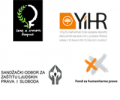Criminal Charge for the Missing brothers Abjanović Dismissed
 The Office of the War Crimes Prosecutor (OWCP) dismissed the criminal charge filed by the Humanitarian Law Center (HLC) at the beginning of February 2019, for the crimes against humanity committed in October 1991 in Morović (Šid). It was then that members of the Yugoslav People’s Army (JNA) took the Abjanović brothers from their house, after which every trace of them was lost. The criminal charge was dismissed because, in the interpretation of the OWCP, the prosecution of crimes against humanity violates the principle of legality. With this explanation, the OWCP continues its practice of failing to process crimes against humanity committed in the territory of the former Yugoslavia, thus denying the right of a large number of victims to finally receive justice.
The Office of the War Crimes Prosecutor (OWCP) dismissed the criminal charge filed by the Humanitarian Law Center (HLC) at the beginning of February 2019, for the crimes against humanity committed in October 1991 in Morović (Šid). It was then that members of the Yugoslav People’s Army (JNA) took the Abjanović brothers from their house, after which every trace of them was lost. The criminal charge was dismissed because, in the interpretation of the OWCP, the prosecution of crimes against humanity violates the principle of legality. With this explanation, the OWCP continues its practice of failing to process crimes against humanity committed in the territory of the former Yugoslavia, thus denying the right of a large number of victims to finally receive justice.
On the afternoon of October 23, 1991, several members of the JNA entered the yard of the Croatian family Abjanović in Morović. They led Ivica and Mato Abjanović out of the house, with the explanation that they would bring them back home after an interview at the police station. After that, every trace of Abjanović brothers was lost, and they are still filed as missing persons.
Between 1991 and 1995, Croats in Vojvodina were exposed to systematic and widespread human rights violations, resulting in threats, beatings and murders, with the goal of expelling them to Croatia. In view of the fact that the Croats in the territory of Vojvodina were exposed to pressures carried out in an organized manner, with the knowledge of the Serbian authorities, the HLC considers that the abduction and disappearance of the Abjanović brothers was a crime against humanity committed in the context of systematic attacks on Croats from Vojvodina.
However, the OWCP’s point of view is that a crime against humanity cannot be prosecuted before a court in Serbia, as it would violate the principle of legality, which states that no one can be convicted of a criminal offence which, at the time it was committed, was not defined as such by law and for which there was no foreseen penalty.
Such a position of the OWCP can be objected to on several grounds. Namely, the provisions of the International Covenant on Civil and Political Rights and the European Convention on Human Rights maintain that the principle of legality cannot be violated if the criminal offence in question was provided for by internal or international law. A crime against humanity was for the first time envisioned as a criminal offence in the Charter of the International Military Tribunal in 1946. The UN General Assembly adopted the 1968 Convention on the Non-Applicability of Statutory Limitations to War Crimes and Crimes Against Humanity, and it was ratified by the then Socialist Federal Republic of Yugoslavia (SFRY) in 1970. Article 1 of the Convention states that a crime against humanity (as defined in the Charter of the International Military Tribunal) cannot undergo the statute of limitation, regardless of the date when it was committed “even if such acts do not constitute a violation of the domestic law of the country in which they were committed”. Therefore, Serbia, as the successor country of the SFRY, has a duty to prosecute a crime against humanity (which is a criminal offence foreseen by international law) committed in 1991, although at that moment in the Criminal Code it was not foreseen as a special criminal offence.
For this reason, the HLC considers that there is no legal obstacle to the OWCP prosecuting crimes against humanity committed in the territory of former Yugoslavia. Although recently the OWCP has dismissed several criminal charges submitted by the HLC for crimes against humanity – for example, the murder of the Matijević family from Kukujevci in 1992, and the handing-over of the Srebrenica refugees who, after the fall of Srebrenica, crossed the border to the territory of Serbia, – it is a fact that the OWCP’s practice has not always gone in that direction. Namely, in 2008, the OWCP requested the conducting of an investigation against Peter Egner for genocide committed during the Second World War, although at that time genocide as a criminal offence was not provided for by Serbian internal law. The then District Court upheld the decision of the investigating judge and allowed the investigation into this case, arguing that the principle of legality was not violated in the light of the provisions of the International Covenant on Civil and Political Rights and the European Convention on Human Rights, which provide that the principle of legality cannot be violated if the relevant act is foreseen by international law and constitutes a criminal offence in accordance with the general legal principles recognized by civilized nations.
Taking into account that the previous practice of the OWCP went in the direction of prosecuting criminal offences that were provided for by international law at the time of execution, it is unclear why the OWCP has changed its practice in cases where it is necessary to prosecute numerous crimes against humanity that were committed in the territory of the former Yugoslavia.
For this reason, the HLC requests from the OWCP that it investigate and prosecute crimes committed against humanity and thus enable the numerous families of the victims of these crimes to receive justice after more than two decades of suffering for their loved ones.








